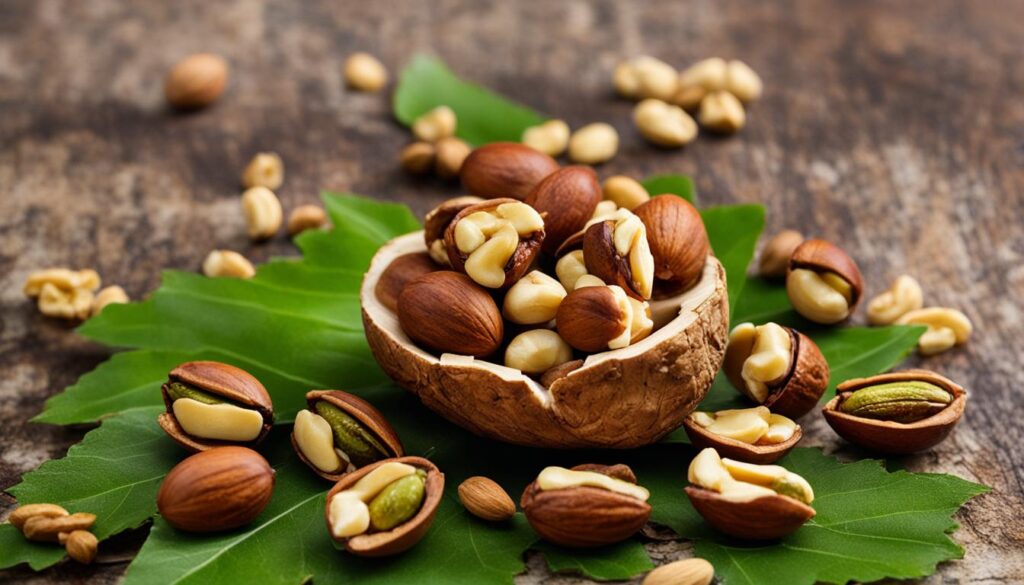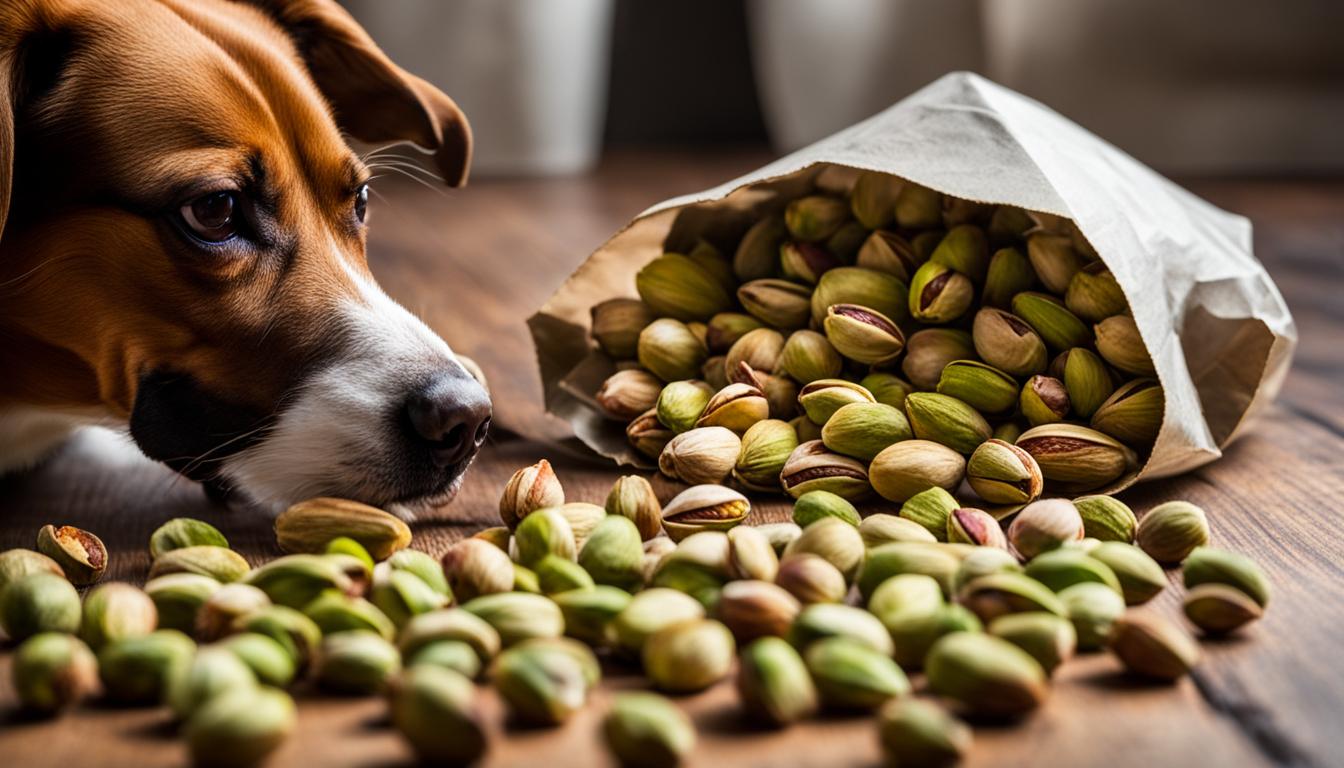As an Amazon Associate I earn from qualifying purchases.
Imagine this: you’re sitting on the couch, enjoying a handful of delicious, crunchy pistachios. Suddenly, your furry friend looks up at you with those big, pleading eyes, hoping for a taste. It’s tempting to share this indulgence with your dog, but before you do, it’s important to know whether pistachios are safe for our canine companions.
We all want the best for our dogs, and that means making informed decisions about what we feed them. While pistachios may seem like a healthy snack, not all nuts are created equal when it comes to canine consumption. Some can be downright dangerous for our four-legged friends.
In this article, we’ll dive into the world of nuts and explore whether pistachios are a dog-friendly option. From their potential risks to their impact on canine health, we’ll uncover the truth about feeding pistachios to dogs. So, before you share your favorite nutty treat with your pup, let’s take a closer look and ensure their well-being is the top priority.
Key Takeaways:
- Pistachios are not recommended for dogs due to their high-fat content and potential to cause gastric upset and pancreatitis.
- Other safe nuts for dogs include peanuts, hazelnuts, and cashews in moderation, as long as they are unsalted and unseasoned.
- Always be cautious of nuts that are made into spreads, as they may contain harmful ingredients like Xylitol.
- When it comes to your dog’s treats, prioritize their health and opt for dog-friendly options instead.
The Benefits and Risks of Nuts for Dogs
Nuts can be a tempting snack for dogs, but it’s important to understand the potential benefits and risks they pose to your furry friend. Let’s take a closer look.
The Benefits of Nuts for Dogs
While nuts should be given to dogs in moderation, they can provide some nutritional benefits:
- Protein and Fiber: Nuts are a good source of protein and fiber, which can support your dog’s overall health and digestion.
- Essential Vitamins: Certain nuts contain vitamins such as vitamin E and B complex vitamins, which play a key role in your dog’s well-being.
- Better Blood Circulation: Nuts like walnuts contain omega-3 fatty acids, which can contribute to improved blood circulation in dogs.
While these benefits are enticing, it’s crucial to consider the potential risks associated with feeding nuts to your dog.
The Risks of Nuts for Dogs
Nuts come with several risks for dogs:
- High-Fat Content: Many nuts, such as almonds and walnuts, are high in fat. Feeding your dog large amounts of high-fat nuts can lead to weight gain and other health issues.
- Gastrointestinal Problems: Some dogs may experience upset stomachs, diarrhea, or vomiting after consuming nuts due to their sensitive digestive systems.
- Pancreatitis: The high-fat content in nuts can also trigger pancreatitis, a potentially serious condition that causes inflammation of the pancreas in dogs.
- Xylitol Toxicity: Nuts should never be given to dogs in the form of spreads or butters, as they may contain Xylitol, a sugar substitute that is highly toxic to dogs and can be life-threatening.
Choosing the Right Nuts for Your Dog
If you decide to give your dog nuts as an occasional treat, it’s essential to choose the right nuts and prepare them properly:
- Unsalted and Unseasoned Options: Always opt for unsalted and unseasoned nuts to avoid exposing your dog to unnecessary sodium or harmful additives.
- Avoid Xylitol: Ensure that the nuts or nut products you give your dog do not contain Xylitol, as even small amounts can be dangerous.
Remember, moderation is key. Offering your dog a few nuts as an occasional treat can be enjoyable, but it’s crucial to monitor their intake to prevent any adverse effects.
| Nut | Risks |
|---|---|
| Almonds | Gastrointestinal upset |
| Walnuts | High-fat content, potential pancreatitis |
| Macadamia Nuts | Highly toxic, weakness, tremors |
| Pecans | Juglone toxin, gastrointestinal problems |
| Pistachios | High-fat content, gastric upset, potential pancreatitis |
Safe Nuts for Dogs
When it comes to nutty treats for your furry friend, not all nuts are created equal. While some nuts can pose risks to dogs, there are several safe options that can be enjoyed in moderation. Here are three safe nuts for dogs:
Peanuts
Yes, dogs can enjoy peanuts! Whether roasted or raw, peanuts can be a good source of protein for your pup. However, it’s important to choose unsalted and unseasoned peanuts as excessive salt or seasoning can be harmful to dogs. So, next time you’re having a snack, feel free to share a few peanuts with your four-legged companion!
Hazelnuts
For larger dogs, hazelnuts can be a safe and tasty treat in moderation. However, smaller dogs may be more prone to choking on these nuts, so it’s important to be cautious. If you have a small dog, it may be best to avoid hazelnuts altogether or break them into smaller pieces to reduce the risk of choking.
Cashews
Cashews can be a delightful and safe snack for dogs when given in small quantities. They can be served as whole nuts or as a dollop of unsweetened cashew butter. Just like with peanuts and hazelnuts, make sure to choose unsalted and unseasoned cashews to keep your pup happy and healthy.
Remember, when giving your dog nuts, moderation is key. Nuts should only be given as an occasional treat and should never replace a balanced diet. Be mindful of portion sizes and always consult with your veterinarian if you have any concerns or questions about your dog’s diet.
“A handful of safe nuts can be a tasty and enjoyable treat for your dog. Just remember to choose the right nuts and serve them in moderation to keep your furry friend happy and healthy!”
Safe Nuts for Dogs
| Nut | Safety for Dogs |
|---|---|
| Peanuts | Safe in moderation, unsalted and unseasoned |
| Hazelnuts | Safe for larger dogs, smaller dogs may have a choking risk |
| Cashews | Safe in small quantities, unsalted and unseasoned |
Remember to always prioritize your dog’s health and choose safe nut options. Enjoy these treats together, and share the joy of a delicious, nutty snack with your furry companion!

Nuts to Avoid Giving to Dogs
While it’s tempting to share your favorite nuts with your furry friend, not all nuts are safe for dogs. In fact, some nuts can cause serious health issues. Keep your pup’s well-being in mind and avoid giving them these nuts:
- Almonds: While tasty for humans, almonds can be difficult for dogs to digest and can lead to gastrointestinal upset.
- Macadamia nuts: These innocent-looking nuts are highly toxic to dogs. Even small amounts can cause weakness, tremors, and joint inflammation.
- Pecans: Pecans contain a toxin called juglone, which can cause gastrointestinal problems in dogs. It’s best to keep these nuts out of your pup’s reach.
- Walnuts: Considered one of the more toxic nuts for dogs, walnuts contain tremorgenic mycotoxins that can cause seizures. Keep your furry friend away from these nuts!
- Pistachios: These delicious nuts are high in fat and can cause gastric upset in dogs. The risk of pancreatitis is also a concern when it comes to pistachios.
Remember, when it comes to your dog’s diet, it’s better to be safe than sorry. Avoid nuts like almonds, macadamia nuts, pecans, walnuts, and pistachios to keep your pup happy and healthy.
Healthy Nut Alternatives for Dogs:
If you’re looking for safe nuts that your dog can enjoy, consider the following:
- Peanuts (unsalted and unseasoned): A good source of protein for dogs in moderation.
- Hazelnuts (for larger dogs): Just be mindful of the potential choking hazard for smaller dogs.
- Cashews (unsalted and unseasoned or as unsweetened cashew butter): A tasty treat for your pup in small quantities.
Always remember to practice moderation and consult with your veterinarian before introducing any new foods into your dog’s diet.

Conclusion
After considering the potential risks and benefits of feeding pistachios to dogs, the verdict is in. While technically dogs can eat pistachios, it is generally not recommended. Pistachios have a high fat content, which can lead to gastric upset and even pancreatitis in dogs. It is best to prioritize your furry friend’s health and well-being by sticking to safe nuts like peanuts, hazelnuts, and cashews.
When offering nuts to your dog, always opt for unsalted and unseasoned options. It is important to remember that some nuts, such as almonds, macadamia nuts, pecans, walnuts, and pistachios, should be completely avoided due to their potential to cause gastrointestinal problems or even toxicity in dogs.
To ensure your dog’s safety, moderate the amount of nuts they consume and be cautious of nut spreads, as they may contain harmful ingredients like Xylitol. Remember, there are plenty of dog-friendly treats available that are both delicious and safe. So, when it comes to pistachios and your furry companion, it’s best to play it safe and explore other tasty options.
FAQ
Can dogs eat pistachios?
What are some dog-friendly nuts?
Are nuts beneficial for dogs?
What nuts should I avoid giving to my dog?
What is the conclusion about dogs and pistachios?
Source Links
- https://www.shilohsvet.com/blog/in-the-know-about-nuts-can-my-dog-eat-nuts/
- https://www.dogvills.com/what-nuts-can-dogs-eat/
- https://doobert.com/here-are-5-types-of-nuts-dogs-can-safely-eat/
As an Amazon Associate I earn from qualifying purchases.

